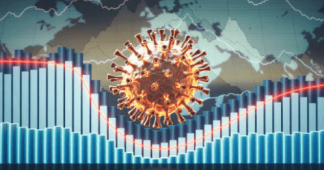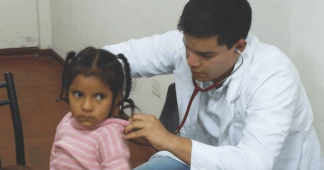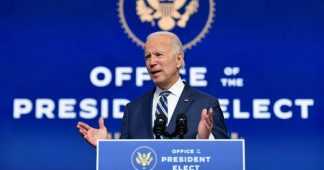By Alison Rosamund Katz
Apr. 16, 2020
For once, everyone agrees. The only way to deal effectively with Covid 19 is through comprehensive, equitable, universally accessible health systems. This was precisely the solution proposed to countries by the World Health Organization (WHO) at the International Conference on Primary Health Care[1] held in 1978 in Alma Ata, in the former Soviet Union.
If WHO’s magnificent social justice project had been supported, all countries today would be adequately equipped to deal with the current health crisis – and all common health problems. But Primary Health Care was not supported. On the contrary, within a couple of years, its social and economic justice foundations were more or less destroyed and the project was progressively dismantled over the next decade.
WHO’s powerful member states, their transnational companies and the international financial institutions, are largely responsible for preventing the establishment and maintenance of functioning, equitable health systems in poor countries and for weakening and dismantling health services in rich countries. They will have a lot to answer for in the coming months.
Primary Health Care is still the solution but WHO’s various attempts at revival have met with fierce resistance from private interests. Never has it been more important for citizens to support and reappropriate the social justice constitutional mandate of the WHO which – for better or for worse – is still the people’s international health authority
Social justice in health: a threat to powerful nations and private interests
Primary Health Care (PHC) as proposed by the Alma Ata Declaration of 1978[2] was a revolutionary, social justice project entitled Health for All by the Year 2000[3]. It identified poverty and inequality, nationally and internationally, as the major determinants of avoidable, premature illness and deaths worldwide (whether epidemic or endemic).
The Alma Ata Conference was held at the end of « Les trentes glorieuses » (1945-1975) – 30 years of progress towards a more just and equitable, and therefore healthier world. This was also the era of decolonization when the need for redistribution of power and resources, including the rights of peoples to self-determination and control over national resources were widely recognized. During this time, there was a sincere commitment in favor of universal and comprehensive public services to meet basic needs for health.
Health For All, was predicated on the New International Economic Order (NIEO) as proposed by the Group of 77[4] and as such it was deeply threatening to the geopolitical order. Within two years it has been reduced to four priority interventions unencumbered by larger issues of economic justice.
Since then, under pressure from rich Member States, WHO has been progressively diverted from its broad public health mandate, promoting development, equity and sustainable health systems and directed towards narrow, vertical, biomedical approaches.
In simple terms, this means ignoring root causes (miserable living conditions) in favour of short term technological fixes; neglecting prevention of disease and promotion of health, in favour of treatment (invariably pharmaceutical), and ignoring the fact that rich countries all significantly and sustainably improved population health by addressing miserable living conditions through public works and public health measures.
What is a functioning health system?
It is important to note that PHC was not just a level of health service. It referred to a comprehensive, multisectoral system in which states (not private sector/philanthrocapitalists) have primary responsibility towards citizens for providing the essential conditions for health, ie food, water, sanitation, education, housing, decent work, a safe environment – and of course basic health services.
Decades of public health experience and research consistently point to the need for publicly funded national health systems with most services provided through public institutions, that is, if, the aim is to establish and maintain comprehensive, equitable, and universally accessible health systems. Furthermore, universal access is significantly facilitated when health services are free at the point of care and this is particularly important in times of crisis, such as an epidemic of infectious disease.
A functioning, sustainable health system requires sovereign and solvent states – a fact that was fully recognized in 1978 and is reflected in the importance accorded to a New International Economic Order. In short, no country whose national economy is strangled by debt, unfair terms of trade, and the continued pillage of natural resources and that is destabilized by uncontrolled financial outflows, wildly fluctuating commodity prices and outside interference in matters of national sovereignty, can possibly establish and maintain a functioning health system.[5] Sovereign and solvent states will deliver Health for All, not international aid, which is an integral part of world’s financial architecture.
Given its explicit call for international economic justice, it was unlikely that PHC would meet with the approval of the global elite.
Primary Health Care: unrealistic or not wanted by the powerful?
Opposition to WHO’s social justice project was powerful and extremely rapid. It was immediately dismissed as « unrealistic », the qualification that invariably means « not wanted by those who decide ». What exactly did powerful nations and private interests not want? To answer this question, we need only to recall the values and principles of Primary Health Care as set out in the Alma Ata Declaration.
« Health is a fundamental human right. »
« The gross inequality in the health status of people particularly between developed and developing countries politically, socially and economically unacceptable. »
« Economic and social development, based on a New International Economic Order, is of basic importance to the fullest attainment of health for all and to the reduction in the gap between the health status of the developing and developed countries.».
« Governments have a responsibility for the health of their people which can be fulfilled only by the provision of adequate health and social measures ».
« PHC includes at least, education, an adequate food supply and proper nutrition, an adequate supply of safe water and basic sanitation etc. »
« PHC involves all related sectors and aspects of national and community development, in particular agriculture, animal husbandry, food, industry, education, housing, public works, communication etc. »
« PHC requires and promotes maximum community and individual self-reliance and participation etc. »
« A fuller and better use of the world’s resources, a considerable part of which is now spent on armaments and military conflicts ».
Imagine the consternation in the corridors of power! One of the most venerable and respected United Nations Agencies, was promoting a project that might be mistaken for socialism. The backlash was savage. Not only was Primary Health Care « not wanted », it was not going to happen. And the WHO would have to be brought under control.
WHO and the trillion-dollar market for health
Since 1978, the people’s international health authority has fallen victim to neoliberal restructuring, as have most social and economic institutions serving the public interest, including of course many UN programs and agencies. The WHO today is on its knees, deeply compromised . . . and forced into the business of health.
By way of illustration, in 2019, WHO’s Director-General, Dr Tedros, presented the « business case » for his organization’s Global Action Plan thus : « The initial investment of US$14.1 billion for the period of 2019-2023 is excellent value for money and will lead to a return on investment by generating 2-4 % economic growth. No commodity in the world is more precious. » [6]
Why must Dr Tedros sell the health sector to investors rather than discuss WHO’s five-year plan with its 194 Member States? Because the WHO today is more or less privatized. It controls a mere 20 % of its budget. The remaining 80 % consists of extrabudgetary voluntary contributions from (rich) Member State and private foundations, almost all of which are earmarked for specific donor driven priorities and programs.
Health represents a trillion-dollar market (US$10 trillion in 2020) as the World Economic Forum never ceases to remind its constituents. « Donations » to the WHO or participation in public private partnerships for health are valuable investments for multinational companies seeking new profitable spheres for their activities. Health is no longer conceived as a human right as declared in WHO’s constitution but as a commodity or at best, an input to productivity – as promoted in 2001 by Jeffrey Sachs in the WHO report Investing in Health for Economic Development.
From Alma Ata to Davos
In January 1999, at the World Economic Forum in Davos, Kofi Annan proposed that the world’s business leaders and the UN « initiate a Global Compact[7] of shared values and principles, which will give a human face to the global market ». With no mandate from his constituency, the UN Secretary General offered UN support « for an environment which favours trade and open markets » in exchange for commitment (with no enforcement mechanism) by corporations to nine principles in the area of human rights, labor, the environment and the fight against corruption.
In similar fashion, WHO, in the 1990s, under Dr Brundtland, adopted donor driven, business models led by the private sector and launched multiple public-private partnerships (PPP) implementing vertical programs addressing specific diseases. These arrangements have further increased the power of multinational corporations to direct health policy and undermined and fragmented health systems in many countries.
Today almost all international health work is organized through public private partnerships which represent yet another mechanism for wealth extraction (from the 99 % to the 1%) by harnessing the public sector for private profit making. There is only one reason why organizations with public responsibilities are adopting these arrangements. They are considered to be the only untapped source of funds which to an extent is true. But that is because under neoliberal regimes, public sector budgets have been slashed and tax bases destroyed. These developments are themselves the result of the influence of TNCs on governments and the international financial institutions.
The solution to the problem of resources for health is not for public bodies to go begging to the private sector or to the foundations of celebrity philanthropists – themselves completely identified with multinational capitalism. The solution today, as it was at Alma Ata 42 years ago, is economic justice and an adequate tax base, as well as proper funding of public institutions such as WHO through regular budgets so that it may fulfill its international responsibilities unimpeded by corporate interests.
Universal Health Coverage: a substantial regression from Primary Health Care
The WHO has made various attempts to revive PHC or at least some aspects of its social justice project, notably in 2008, with the publication of Primary Health Care: Now more than ever. Close reading of this report reveals a version of PHC amputated of all the values and principles of Alma Ata. Incredibly, no mention was made in the report of health as a human right, of the social and economic determinants of health, of the state’s primary responsibility for health, of emancipatory development and a spirit of self-reliance and self-determination, let alone the need to address poverty and inequality through a New International Economic Order.
WHO’s subsequent attempts to revive PHC have paid lip service to human rights and sometimes refer to inequality within societies (but never between countries) but none of them mention the real pillar of Health for All which is a fair and rational international economic order.
Since around 2000, in view of the lack of support by its financial backers for any genuine revival of PHC, the WHO has drastically curbed its ambitions and now struggles to promote something called Universal Health Coverage. As currently conceived, and despite invocations of the spirit of Alma Ata, UHC has retained some aspects of PHC but in several ways, it represents a substantial regression from WHO’s social justice project.
Let us remember first that population health is determined largely by factors outside health services, hence the priority that PHC accords to addressing the social and economic determinants of health. UHC, despite the name, refers almost exclusively to health services, so by comparison with PHC, its scope is narrow.
Furthermore, UHC which originally referred to Universal Health Care became Universal Health Coverage reflecting a further reduction in scope to the narrower question of the financing of health services. In the latest dilution, achieved through bullying of the WHO by the USA, UHC seems to be about ensuring a substantial role for private provision of health services and private, voluntary health insurance for financial coverage.[8]
Decades of health systems research show that these are recipes for inequitable health care systems, extremely high costs to the state and to citizens (through out of pocket spending on health), lack of accountability, inefficiencies in health care provision, the transfer of scarce resources from the public to the private sector and of course inequalities in health outcomes.
Oxfam International reports that the only low income countries that have achieved universal and equitable health coverage have done so by relying mainly on tax, rather than insurance. While health insurance schemes may be workable in high income countries, in low income countries, even social health insurance tends to exclude the majority of people and leave the poor behind.[9]
Covid 19 in OECD countries is revealing to many citizens the role of austerity measures in weakening health system capacity. In poor countries with poorly functioning health systems that were seriously damaged by IMF-imposed Structural Adjustment Programs, among other neoliberal policies, the virus is likely to overwhelm health system capacity within days. For half the world’s population who lack access to essential health services,[10] there may be no care at all.
Member States defend the interests of their TNCs at the World Health Assembly
Under neoliberal regimes, powerful Member States, increasingly represent the interests of their TNCs at the annual World Health Assembly rather than the public health interests of their citizens. So, for example, they support the food, beverage and agribusiness giants when non-communicable diseases or nutrition are on the agenda, Big Pharma, in relation to access to medicines, and the entire for-profit health sector, including medical equipment, private health service providers and private health insurance companies, in relation to UHC.
According to the Deloitte Consultancy Group, the health market is set to increase by 5 % annually. The for-profit health care sector is dominated by the USA followed by the UK and other OECD countries but it is one of the fastest growing sectors in many countries’ economies. Given these colossal economic interests, any WHO initiatives to promote health care as a public good and a human right will continue to be opposed by the global elite.
Poverty and inequality today and reports of « progress »
The World Bank regularly reports progress in poverty reduction but close examination of the data reveals multiple manipulations, and the uncomfortable fact that when China is removed from the picture, virtually no progress has been made and indeed, poverty has increased in many sub-Saharan African countries.
Gross inequalities in wealth continue to accelerate (today the richest 1% in the world have more than double the wealth of 6.9 billion people). What is the relevance to population health? Unequal power relations are themselves the root of poverty – and therefore poor health; and inequality, over and above any material wealth or deprivation, is bad for health and for cohesive, safe, societies.
WHO and UNICEF reports show that inequalities in health status of people between and within countries remain unacceptably high.
Under five mortality in Sub Saharan Africa in 2018 was 14 times higher than in high income countries (1 in 13 as opposed to 1 in 185).[11] More than half of these early child deaths are preventable or can be treated with simple, affordable interventions including immunization, adequate nutrition, safe water and food and appropriate care by a trained health provider when needed.
Maternal mortality rates in 2017 in low and lower middle income countries was 462 per 100,000 live births compared to 11 in high income countries.[12] The lifetime risk of maternal death is 1 in 45 in low income countries and 1 in 5400 in high income countries. WHO notes that fewer than half of all births in several lower and lower middle income countries are assisted by a health professional (nurse, midwife or doctor).
According to a UN 2019 report, life expectancy in sub-Saharan Africa is 61 years, 70 in Central and South Asia, 79 in Europe and North America, and 83 in Australia and New Zealand[13].Differences in life expectancy within countries are also very high: in France, 13 years between the most and the least affluent.[14] Note that even the smallest percentage differences in life expectancy reflect significant social and economic inequalities.
Plutocratic governance of health is responsible for health system failure
Over the past four decades, the WHO has gradually lost control of its budget and therefore its program of work, partly because the organization had become (for a brief moment) a bit too socialist, but partly because, under the capitalist imperative, it is intolerable for such a potentially profitable sector to remain unexploited.
International health today is controlled by the World Bank, the G8 (possibly G20), their TNCs, the foundations of philanthrocapitalists (notably the Gates Foundation), and the World Economic Forum with the WHO potentially reduced to the role of broker of public private partnerships, increasingly called multistakeholder partnerships today.
The problem with these arrangements is as follows. Public private partnerships in health:
- Allow private interests to set/influence the public health agenda.
- Sacrifice broad public health goals of prevention of disease, protection and promotion of health, and tackling the underlying social and economic determinants of avoidable disease and death
- Prioritize technological interventions, cosmetic and unsustainable, which generate profit for a minority.
- Favour short term, vertical approaches and the privatization of essential public services rather than horizontal, comprehensive and sustainable public services.
- Provide legitimacy to corporations’ activities through association with UN agencies (bluewashing) blurring roles and real interests.
- Compromise public agencies, including UN agencies and make them « call the tune » for private interests of a tiny privileged minority rather than for 7 billion people.[15]
Through its Global Redesign Initiative, the World Economic Forum is proposing to replace intergovernmental decision making (in 8 main areas including health) with multistakeholder partnerships, strongly influenced if not led by the agenda and interests of the private corporate sector. Government by corporations rather than multilateralism.
Make no mistake there is only one stakeholder – the transnational corporation – and one sponsor – its national home, usually one of the G8, in these multistakeholder partnerships. All other « partners » are there to legitimate corporate control of public goods. Specifically, TNCs are not partners with the WHO or any other UN agency, for the simple reason that they do not share the same goal. This does not mean there is no interaction with the private sector; this has always existed. But the private sector has no role to play in public policy making.
« Social injustice is killing people on a grand scale » (WHO, 2005)
On the rare occasions when the World Health Organization operates without private sector influence, it does extremely valuable work. In 2005, the WHO Commission on Social Determinants of Health[16] reported that « the unequal distribution of health damaging experiences is not in any sense a « natural » phenomenon but is a result of a toxic combination of poor social policies and programs, unfair economic arrangements and bad politics ».
« Health damaging experiences » include preventing the establishment and maintenance of Primary Health Care in poor countries and the weakening and dismantling of health systems in rich countries. Fatality rates of Covid 19 are likely to be high, perhaps very high, in poor countries. The responsibility of powerful economic actors in these deaths must be recognized and denounced.
The only positive outcome of a pandemic of infectious disease, such as Covid 19, is that the world’s people will demand the independence of the WHO from corporate control and a genuine revival of Primary Health Care, through the visible hand of social justice rather than the invisible hand of the market.
Notes :
[1] The conference was co-organized with UNICEF, the United Nations Children’s Fund
[2] https://www.who.int/publications/almaata_declaration_en.pdf
[3] On this subject, see CETIM’s book : La santé pour tous! Se réapproprier Alma Ata. Edited by Julie Duchâtel and Alison Katz. CETIM, Genèva, 2007. https://www.cetim.ch/product/la-sante-pour-tous-se-reapproprier-alma-ata/
[4] http://humanityjournal.org/issue6-1/the-new-international-economic-order-a-reintroduction/
[5] As Fidel Castro remarked, Cuba, with its excellent health system, and despite sanctions, enjoyed the privilege of not belonging to the IMF.
[6] Presented in a Global Action Plan during the last World Health Summit in Berlin.
[7] https://www.unglobalcompact.org/what-is-gc/mission/principles
[8] People’s Health Movement et al. Global Health Watch 5 : an alternative world health report. Zed Books, London, 2017.
[9] https://www.oxfam.org/en/research/universal-health-coverage
[10] https://apps.who.int/iris/bitstream/handle/10665/259817/9789241513555-eng.pdf
[11] https://childmortality.org/files_v22/download/UN IGME Child Mortality Report 2018.pdf
[12] https://www.who.int/news-room/fact-sheets/detail/maternal-mortality
[13] https://www.un.org/en/development/desa/population/publications/pdf/mortality/WMR2019/WorldMortality2019DataBooklet.pdf
[14] https://www.ined.fr/en/everything_about_population/data/france/deaths-causes-mortality/life-expectancy/
[15] https://www.ncbi.nlm.nih.gov/pmc/articles/PMC1240108/
[16] https://www.who.int/social_determinants/final_report/csdh_finalreport_2008.pdf
Published at www.investigaction.net











